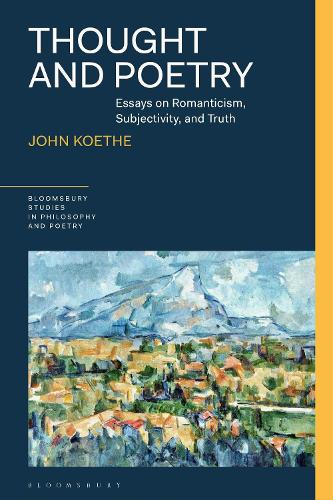
Thought and Poetry: Essays on Romanticism, Subjectivity, and Truth
(Paperback)
Available Formats
Publishing Details
Thought and Poetry: Essays on Romanticism, Subjectivity, and Truth
By (Author) John Koethe
Bloomsbury Publishing PLC
Bloomsbury Academic
19th October 2023
United Kingdom
Classifications
Tertiary Education
Non Fiction
Philosophy of language
Philosophy of mind
809.1
Physical Properties
Paperback
210
Width 156mm, Height 234mm
Description
Addressing objective and subjective views of the self and the world in philosophy and poetry, this collection brings together a chronology of John Koethes thoughts on the connections between the two forms and makes a significant contribution to unsettling the oppositions that separate them. The essays traverse the philosophical conception of the self in modern poetry and locate connections between poets including William Wordsworth, Wallace Stevens, and John Ashbery alongside philosophers including Kant, Schopenhauer, and Wittgenstein. Koethe pays special attention to romantic poetry and notions of the sublime, which he maps onto subjective individual experience and the objective perspective on the natural world. Koethe further explores this theme in a new essay on romanticism and the sublime in relation to the mind-body problem. Using an associative and impressionistic style to write philosophically about poetry, Koethe defends his own approach that such writing cannot and should not aim for the rigor of philosophical argumentation.
Reviews
[Thought and Poetry] exalts poetrys place within the hierarchy of the minds activities and adds one more reason why poetry ought to be taken seriously. * Sun News Austin *
Beautifully lucid, John Koethes Thought and Poetry examines poetry with the care of a trained philosopher and with the lan of one of our most rewarding poets. Here we find remarkable essays on Wordsworth, Eliot, Stevens, Moore and Bishop, and we also delight in the most insightful discussions of Ashbery ever written. But there is more: Koethe also takes us into the central issue of poetry and subjectivity and, perhaps above all, shows us how we might think of poets as philosophically interesting without expecting them to do philosophy in their poems. The task, rather, is to see the best of modern poetry as at heart reflective or contemplative. * Kevin Hart, Edwin B Kyle Professor of Christian Studies, University of Virginia, USA *
We humans are subjects. Each of us is out to sustain and consolidate a thin, diaphanous point of view that springs up within and asserts itself over and against an objective world composed for the most part of thicker, sterner stuff. The meditative lyric tradition of Wordsworth, Eliot, Stevens, Bishop, and Ashbery ponders this predicament in one way. A core tradition in philosophy of mind and action, the tradition of Descartes, Hume, Kant, Wittgenstein, and Nagel, does so in another equally speculative, equally inconclusive, no more abstract. The philosopher thinks in words chosen to constitute a reasoned response to the thoughts of her predecessors. The poet thinks in words chosen out of desire. John Koethe is one of my generations finest philosophers and one of its most wonderful poets. These two vocations have contrived to take turns in Johns working life. Hes never courted crossover appeal by trying to philosophize as a poet or write poetry as a philosopher. Yet in these occasional pieces written over the years, some of them critical, some philosophical, poetry and philosophy reckon with each others existence more fully than ever before. * David Hills, Associate Professor of Philosophy, Stanford University, USA *
This is a terrific collection. Koethe, drawing on his identities as poet and philosopher, treats poetry and philosophy as speculative activities that share many concerns, but that also deeply diverge in their constraints and aspirations. He has a wonderful gift for exploring temptations and oscillations of thinking, ideas we care about and may be compelled to inhabit, and desires and temperaments at work in both philosophical and poetic projects. While this is not in any sense a dogmatic collection the essays are in a searching, almost conversational register, Koethe does not shy away from staking out provocative commitments and critical judgements that show an enviable intellectual and creative reach. His own speculative thinking is alive and well in these essays. * Eileen John, Reader in Philosophy, University of Warwick, UK *
A philosophically deep treatment of the relations between poetry and philosophy. Especially illuminating, even edifying, in its treatment of philosophically sensitive "meditative poetry." The meditative poet does not aim to contribute to the resolution of the big issues. Instead he inhabits the philosophic dialectic, displaying the ebb and flow of thought, this to contribute to our understanding of what it is to be human. * Howard Wettstein, Professor of Philosophy, University of California, Riverside, USA *
Author Bio
John Koethe is Distinguished Professor of Philosophy Emeritus, University of Wisconsin-Milwaukee, USA.
